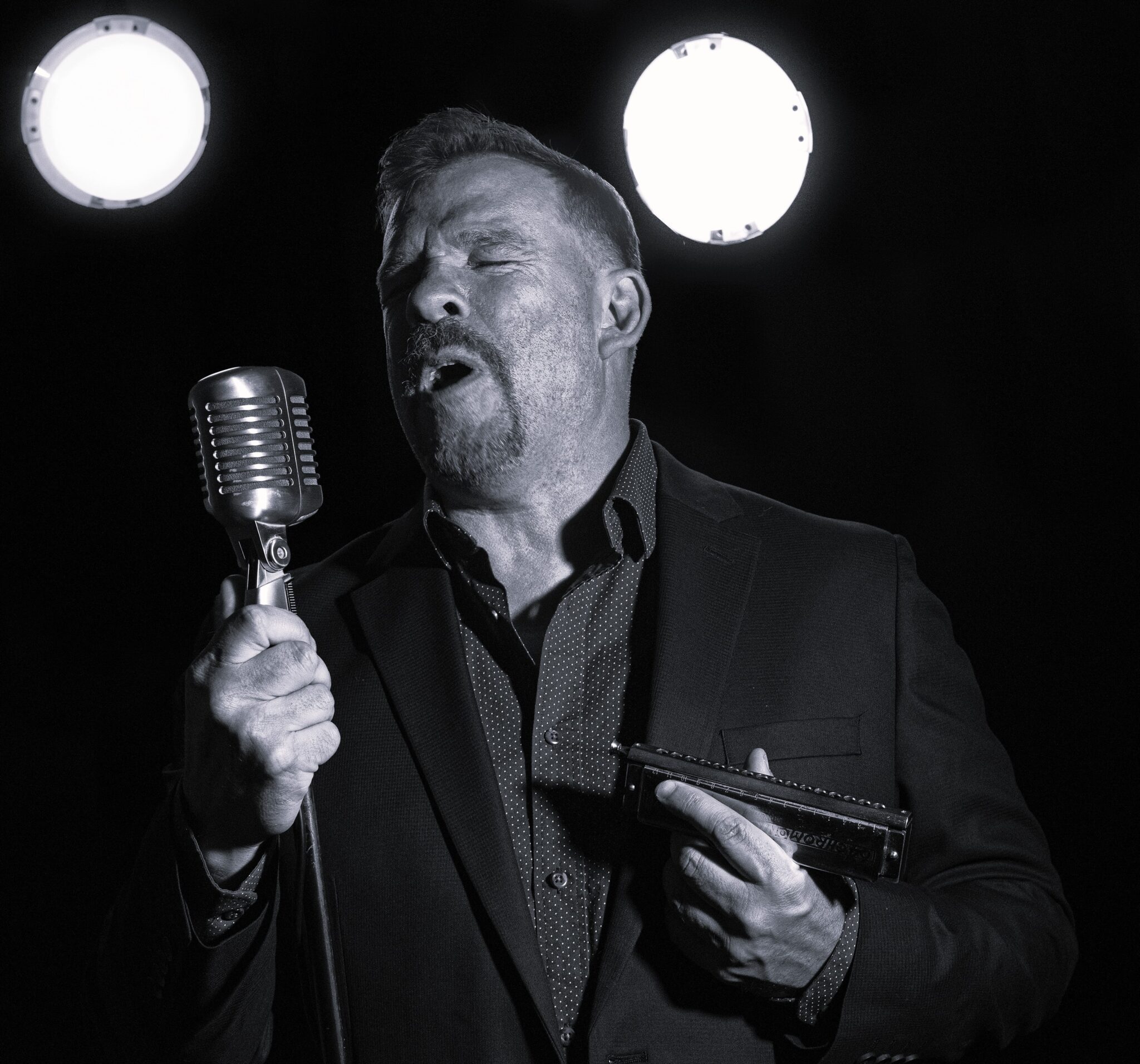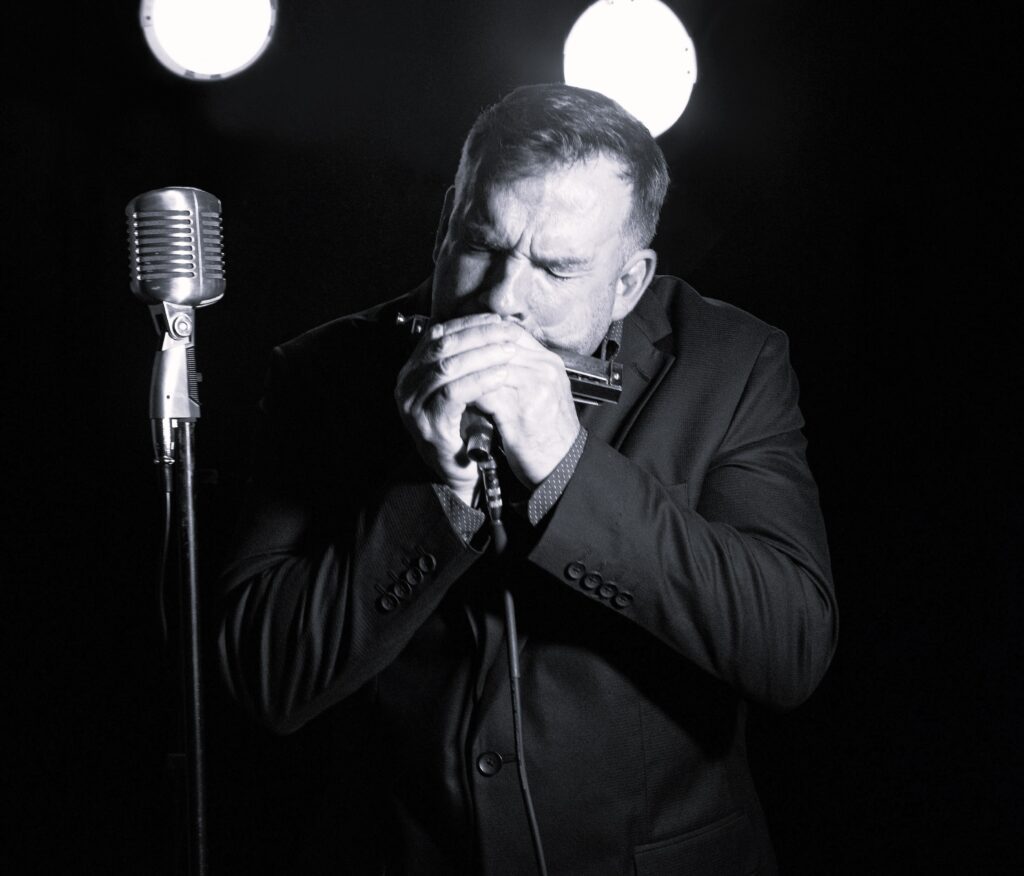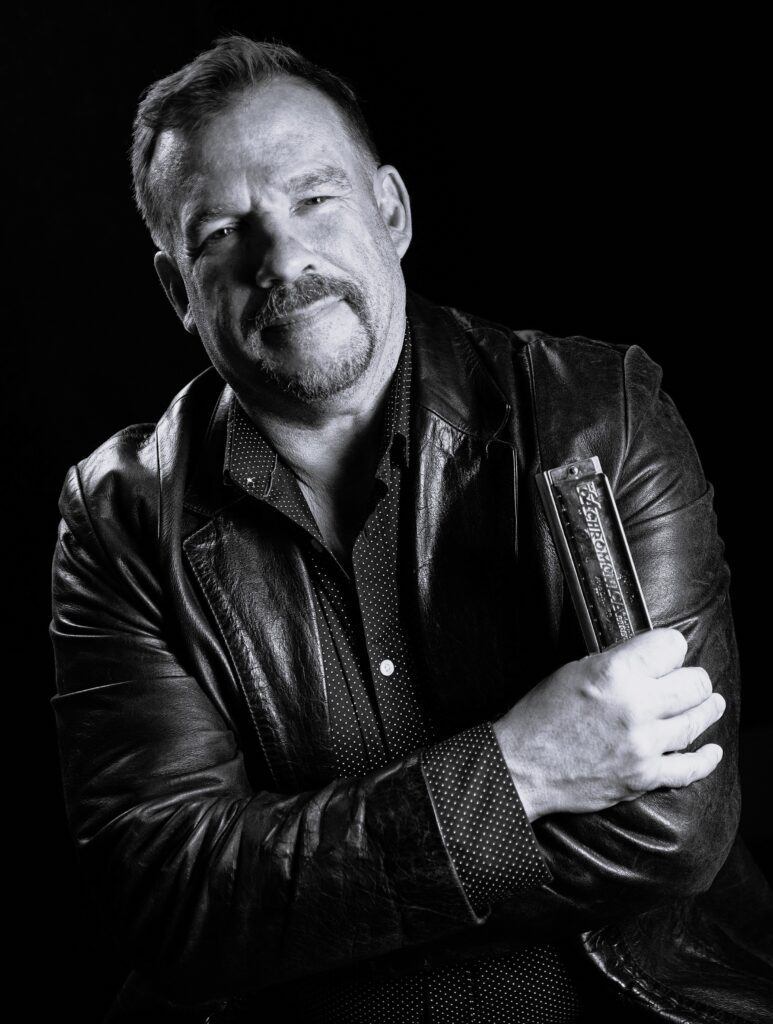Chris O’Leary : The Blues Lines
By Matteo Bossi
Every artist has a different way to navigate his or her musical journey. There is no doubt that Chris O’Leary’s path has been a quite singular one. A former Marine, then one of Levon Helm Barnburners, then again a stint as a Federal Police officer before going back to music full time. He speaks about all that and more during our conversation. The occasion is given by the upcoming release of his new album, “The Hard Line”, the first one on Alligator, which he is very happy about. And rightly so. “Honestly it’s a dream come true. I grew up listening to Big Walter Horton, James Cotton, Junior Wells, Albert Collins, William Clarke, Son Seals, Hound Dog Taylor…I had all those records in my collection. So I’ve been dreaming to be on Alligator for decades!”
You mentioned James Cotton as one of you idols, because one of the first blues records you listened to as a kid was “Hard Again” by Muddy. Then some twenty years later you become friends with Cotton, how about that?
It was when I played with Levon, because James and Levon were old friends. We played at a club in New Orleans and one day I was in a hat store in the French Quarter and my bass player was tapping me on the shoulder. There he was Cotton! Larger than life, he was supposed to play with us that night. I was nervous but I went up to him and he could not have been any nicer. Wes truck up a friendship and he was good to me. Sometime when you meet your heroes you build them up so high in your head that they’re gonna let you down…it wasn’t like that with James. He was everything and more, a wonderful human being. The world is a lesser place without him in it.
That must have been the “Funky Little Club On Decatur” that you sing about in one song.
Yes it was.
You said before that one of the first gigs you went to was when The Band reformed in the early Eighties.
Yes, with Earl Cate playing guitar with them, Richard (Manuel) was still alive, and there was Levon with Rick and Garth. With my dad and my uncle Mike we went to Albany, the capital of New York to see them. And probably like fifteen years later I was in a band with Levon. Funny how things happen. I had always played music, since high school, guitar, harmonica once my dad got me one. I was into music, all kinds, that’s the house I grew up in. On a Sunday there could be polka, opera or Bruce Springsteen, Muddy Waters…After high school I joined the Marine Corps. When I got out I went to a college in Upstate New York called Marist. And there was a thriving blues scene in the area. Joe Louis Walker lived there, this guy Pete Kanaras who played with the Nighthawks, Murali Coryell…it was really a good scene in this little town. I started to go less and less to school and go out more and more to play and watch blues. Then I formed a band, we played regional and then eventually hooked up with Levon.
How did you get to know Levon?
We had a mutual acquaintence. The photographer for The Band was Elliott Landy and when he stopped doing it, this guy George Lembesis took over. And George was a friend of ours. I was making a demo and George took a copy of it and put in Levon’s stereo, knowing that he loved Chicago blues. That’s how it happened. Next thing I know Levon came out and played on the demo, he had a great time.
The name of your band was Eldorado Kings? You are quoted in “Levon”, the book by Sandra B. Tooze about him.
Oh yes! We did a lot of blues but mostly stayed to Chicago, Muddy, Walter, Junior Wells, Big Walter, Sonny Boy…straight Chicago. I was like tunnel vision, I would listen to Little Walter every single day. I’d wake up, get something to eat and put on Little Walter or Sonny Boy…every day. Going down to New Orleans blew my mind. It opened up musical possibilities, still within the tradition…just the instrumentation. You’d see a little Dixieland band around the corner…being and living in New Orleans was an important time as far as my musical growth.
It still is part of your music, in the new record we can hear it.
It’s my favorite place, it’s dirty and a nasty old city but I love that. Then the club, American Cafe, closed down and Levon put me, Pat and Frankie, the guitar player and bass player on a train, he said “boys I’m sending you back to New York, when I’ll finish this business here we’ll get back together in Woodstock and plan what we’re gonna do”. We took the train from New Orleans to Penn Station in New York. I swear it was a two days trip, real long! When we got back he said this is the band and we’re gonna start touring. That’s what we did for six years or so.
You never recorded anything with that line-up of The Barn Burners?
We recorded some but I don’t know where it is, somewhere in the vaults at the Barn. On some recordings Bob Margolin played guitar and David Maxwell played piano. It’s somewhere, but it was never released. The original version of my song “The Grass Is Always Greener”, that I recorded on my first solo album, I did with Levon and it’s in those vaults. He helped me write another song on that record, “Waters Risin’”, he came up with the groove.
Both Cotton and Levon Helm grew up in the same area, around West Helena.
Yes, Phillips county. You look on the levee and you see Robert Junior, Pinetop…all the people that grew up around Phillips county or across the river in Mississippi. They’re all there. We played the King Biscuit this year and it’s like a homecoming, all Levon’s friends came to see me. I love it there. If you go into the Delta Cultural Museum there is the original Peck Curtis / Sonny Boy King Biscuit drum set, well Levon donated that. Peck was his guy. Levon at some point picked up that drum set, he kept it in Woodstock for a little while then donated to the Museum. The history there is just amazing. This year we got to play at the King Biscuit, then on Sunday in Clarksdale and then we did the Pinetop’s Homecoming with Bob Margolin and we did just straight Muddy stuff. Muddy’s gone but the next best thing is playing with Bob.
Then what happened? Did you have to stop at some point?
We were doing a long tour with Levon and I had been having vocal problems. We were in bottom of Florida at a place called The Bamboo Room for two nights. But I had nothing left. I got through the nights and went to New York to see a doctor; he put a scope down my throat and said “you got to stop singing”. They offered surgical options, I had nodes…but the surgery did not sound good. I took some time off and then life took over. I got married and then eventually I became a Federal Police Officer…there’s only a few things the I could do, music was off the table so I had to go back to what I learned in the Marine Corps. I became a cop for a while. Then, if you’re a musician and you know that’s what you’re meant to do and you can’t do it, it leaves a hole in your soul. So I started making phone calls, my voice was back and I got a vocal coach, I started to pick my keys better…I used to sing really hard. People like Lee Roy Parnell and Kim Wilson told me “Chris you got to ramp it back a little bit, ‘cause you’re gonna hurt yourself”. So now I still sing hard but not nearly as hard as I did. I called Bob (Margolin) and people who could give me the right direction to go. Bob got me a deal with Vizztone. For about six or seven years I did both jobs, officer and full time musician. I kept the day job and still doing one hundred dates a year. Then injuries that I got in the marines and the fact that I wanted to just do music, I was spending more time arranging my schedule than I was writing music, I started doing music full time and it’s been a blessing.
How did you develop your songwriting?
My dad was a storyteller, so I had that in the family. Levon was all about the song, I learned a lot of lessons from him, but the most important one is whatever you’re doing, singing, playing a solo or rhythm behind someone, if you’re not supporting the narrative of the song, then you got to be doing something else. And I’ll tell you what, for this new record, Bruce Iglauer was a huge help. If I listen to my earlier records, there are seven or eight minutes songs…Bruce has made my writing much more succinct, to the point. Recording this album I was very much in correspondence with him and he has made me a better songwriter. After that many years of doing what he does he’s been really helpful. Even the ones that didn’t make the cut, I’m reworking them and I have the next record almost written already. The good thing of living a crazy life is I have a huge palette to draw from, a lot of experience, good and bad.
In a new song, “I Cry At Night”, you talk about veterans coming back from service with PTSD or other problems.
I had locked out in that regard in a way. My dad is a veteran too and when he got out of the army he went back to school and became a psychologist. He got a PhD. So I when I got back from the war I was slipping a bit. Things weren’t going good for me. My father knew what was going on, he not only had experience as a veteran but also had an education as psychologist. Most veterans don’t have that. It’s something very important to me. Alligator is giving me a much bigger platform so it’s my responsibility to draw attention to it, because it’s a problem in this country. It still is. I heard some guys coming back home and the country, the government in particular can’t turn their back on them. They’re going through some stuff. The more attention maybe the more funding, but anyway it’s something that people should know about.
And you have Mike Welch on guitar on this one.
When I wrote that I was thinking about a Fenton Robinson type thing. And maybe doing the guitar myself. But Bruce said to me “let’s take it in another direction. I’m hearing Otis Rush here”. We both thought immediately: Mike Welch. Mike does his thing but I don’t think there is anybody that evokes that spirit, drama, that vibrato of Otis like him. And what a pro! We sent him the track saying we both thought he’d be perfect for this. He liked the song and I swear he sent back a solo in no time and it was perfect. Bruce said “let’s make a few changes here and there” And fifteen minutes later Mike had done the changes. My piano player, Brooks Milgate, plays with Mike too. I was thrilled to have him on the record, he’s for sure one of the best guitar players out there.
And I love the stuff he did with the late Mike Ledbetter.
Oh indeed. Did you ever see a video that I guess Nick Moss took of Mike Ledbetter singing Ave Maria in a church somewhere? My ex wife had epilepsy as well it can be devastating, even the drugs that she took to keep it under control were serius. What a loss, Mike’s passing was a shock.
Did you ever get robbed like you sing in “Who Robs a Musician?”
I did! Every band that does significant road work…we’ve all got robbed. You’re out there in a van who basically says “come robe me, there’s good stuff in here”. Last time after we did the King Biscuit Festival, we went across the river and stopped at a Cracker Barrel in West Memphis, it was during lunch. We got robbed in Chicago but this was worst, it was in the middle of the day and they took a lot. But it’s like robbing the poor, we’re not making a lot of money. So yes that was directly from personal experience.
Another song I like “Things Ain’t Always What They Seem” and it reminds me a bit of Delbert McClinton.
Delbert is a huge influence on me. I wrote that song years ago. But in its initial inception it had three different characters with three separate stories with the overall theme being “things ain’t always what they seem”. I sent the original version to Bruce. And he was “dude, you can’t handle this you’re asking the listener not just to follow one narrative but three in a five minutes song”.
Like a Bob Dylan song, say “Tangled Up In Blue”.
Exactly, Bruce added “…unless your name isn’t Bob Dylan or Leonard Cohen! Someone shouldn’t need a road map to figure out your song”. He said “why don’t you pick a character and expand on that”. And that’s what I did. In one night I rewrote the lyrics in one night, I’m an insomniac. And it made it a much more powerful song. The thing about Delbert is he could be playing country, soul or blues and he still sounds like Delbert and somehow he’s sounding so authentic. I can’t think of anybody else like that, someone who can travel genres and still sound like himself. He’s amazing. I got to play once with him in Nashville, we did a Jimmy Reed song and it was awesome. He was like, “you got an A harp?” And I gave him one.
You put out a couple of records on American Showplace Music, Ben Elliot’s label. And Elliott passed away too in 2020.
It was at the beginning of the covid scare. He had cancer, but there’s no way I thought cancer was going to take him. Ben was a fighter. Things got better and then all of a sudden he was gone. I think me and him left a lot on the table. There was talk about doing an Americana album…it was a big loss, I did not see it coming. Not Ben, he had no give up in him. Whatever beat him it must have been significant. The first time I met him when I recorded a song on a Hubert Sumlin album, “About Them Shoes”, Ben was engineering it with Rob Fraboni. Levon got me involved in that. I was the only nobody, surrounded by rockstars, like Keith Richards, Blondie Chaplin or Eric Clapton, but it was fun. I tried to get stories from people like Cotton or Hubert. I was a history major in college and getting stories first hand…these guys…it’s walking and talking american musical history. Some of the stories Cotton told me were tough to get sometimes because of his voice, Hubert told me crazy stories about Wolf. Cotton told me the scene in Cadillac Records where Little Walter drove a car through a playglass window really happened, he said he was was there.
Levon got a couple of Grammys for “Dirty Farmer” and his work with Larry Campbell.
He was in good spot when he passed, I still go down to the Barn we go fishing there once a year with my son and my stepson, I call Sandy, his wife. They still do the Ramble, Amy pretty much runs the place and she is a great singer. There is still a scene. New York has never been a blues place like Memphis or Chicago. With Levon we played at the opening of the B.B. King club but it has since closed, everone treated you well, but again being with someone like Levon it’s amazing how you get treated. But you know, I remember when Bobby Keys played with us, for about a year he was a member of the band, him and Levon would drive together. I don’t think there’s anybody like him in rock history…he played with the Beatles, Stones, Clapton, Elton John, Joe Cocker, Delaney & Bonnie…when he was a kid Colonel Parker called him and that’s Bobby playing baritone on Elvis “Return To Sender”. He should be in the rock’n’r oll Hall of Fame. Hubert too. He should be there. All those english guys, Page, Beck, Clapton they all saw Hubert as a huge influence. Maybe they eventually get him in but it’s too late. What’s the sense when they’re dead?
How do you see the current generation of blues artists?
It’s a very good thing that young artists are reclaiming their heritage. Artists like Kingfish, Marquise Knox or DK Harrell. Because it’s plain and simple an african american heritage. I love it and I can relate, I only write about what I know…and some of themes of the blues are universal, no matter what culture you’re from, whether the despair or the joy is universal.
Did you perceive this universal common thread back then when you did travel the world with the Marines?
Not really, while you’re in the Marine Corps you see tiny little snapshots of places. And usually you’re in places in crises, with people going through the worst things. They say you have seen the world, but you really don’t. That made me a bit of a pessimist. But when I tour with Levon or with my band it has given some optimism, because there can be a language or cultural barrrier, but it doesn’t matter. People respond to the same things. I didn’t see it then. That’s why I would love to play Italy, I’ve never been, it’s a bucket list place. A few other places I’d like to go like Greece, Japan and Australia. You get treated like a rockstar there, here you don’t and the audience is generally very knowledgeable. If you play a club here, there’s fifty/fifty chance they know who Hubert was, especially the younger the audience is.











Comments are closed